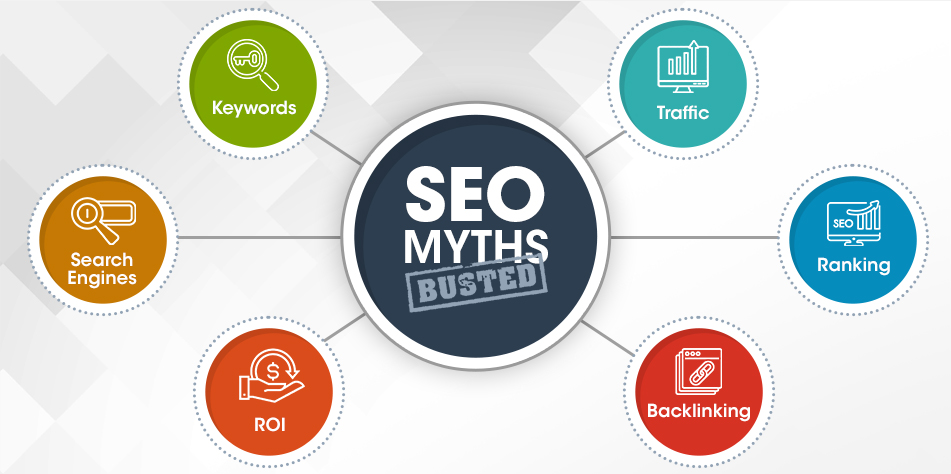
The landscape of search engine optimization (SEO) is constantly changing. Search engines constantly update their algorithms. This requires businesses to stay informed to succeed.
Amidst all this, misinformation about SEO is widely spread, which can distract you from your goal of reaching your target audience. That’s why we’re here with this guide to dispel common SEO myths.
It will empower you to make strategic decisions to help your business grow online. Let’s get started!
Myth 1: SEO is a Quick Fix
Many businesses fall for the idea that SEO is a one-time task, expecting their website to magically reach the top of search results with just a few changes. Unfortunately, the reality is different. It requires ongoing effort.
Search engines are constantly evolving, which means your strategy needs to improve as well. Regularly updating your website’s content, addressing technical issues, and staying up-to-date on trends is crucial for long-term success.
Myth 2: Keyword Stuffing is Effective
Keyword stuffing involves cramming your website content with repetitions of the same keywords or phrases. It’s a deceptive tactic intended to manipulate search engine rankings.
This practice makes your content difficult, unpleasant, and spammy for users to read. Significantly, search engines have evolved to spot keyword stuffing instantly, which will penalize your website’s ranking instead of improving it.
Myth 3: Keyword Cannibalization
Keyword cannibalization is a common consequence of keyword stuffing. It occurs when multiple pages on your website compete for the exact keywords and target the same search intent. It creates confusion for search engines and makes it difficult for them to determine which of your pages is the most relevant result for a particular search query.
Search engines need help deciding which of your pages is a better fit for the search query. It can lead to them displaying neither page prominently in the search results.
If you want to learn how to fix keyword cannibalization, explore popular online resources. Find comprehensive guides teaching about strategies and reliable keyword cannibalization checkers like Serpple.
With a clear focus, it becomes easier for search engines to determine which of your pages is the most relevant for a specific keyword or search query.
Myth 4: Quantity Over Quality for Backlinks
Many businesses fall for the trap of thinking that simply getting more backlinks will automatically boost their rankings. In reality, it’s the quality of these backlinks that genuinely matters.
A single link from a relevant, high-authority site within your niche holds far more weight than numerous links from spammy, low-quality sources.
Focus on building relationships with reputable websites in your industry to gain backlinks that signal to search engines that your content is valuable and trustworthy. Low-quality backlinks can hurt your website’s reputation and lead to search engine penalties.
Myth 5: Meta Descriptions Don’t Impact Rankings
It’s easy to assume meta descriptions do not affect your website’s rankings. While they aren’t a direct ranking factor, meta descriptions play a crucial role in attracting clicks to your website. A well-crafted meta description acts as an advertisement for your page in the search results.
By writing compelling meta descriptions that accurately reflect your page content, you can significantly boost your click-through rate (CTR). Search engines pay attention to CTR, which can positively influence how your pages are ranked over time. Additionally, an enticing meta description encourages potential visitors to choose your website over other results, increasing your website’s traffic.
Myth 6: Social Media Doesn’t Impact SEO
Many businesses mistakenly believe that building a robust social media presence has no impact on their search engine rankings. While social media activity isn’t a direct ranking signal, it offers significant indirect benefits for SEO:
- Increased Brand Visibility: A solid social media presence gets your brand name and content in front of a larger audience. This increased exposure can naturally lead to more people linking to and talking about your website online.
- Backlink Opportunities: Active social channels make it easier for others to share your content. It can lead to valuable backlinks from other websites and blogs, signaling authority to search engines.
- Wider Potential Audience: Social media allows you to connect with a broader audience. When you share engaging content, people are more likely to discover and share links to your website, boosting traffic and overall brand awareness.
Sum Up
Understanding and avoiding these common myths is crucial for any successful online marketing strategy. Stay proactive in your approach and keep learning new best practices. Remember that SEO is a process, not a single task. For complex issues, don’t hesitate to consult with SEO professionals to guide your website on the path toward search engine success.
Leave a Reply